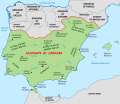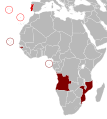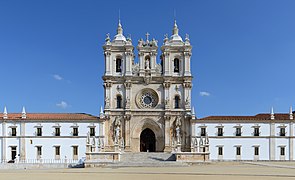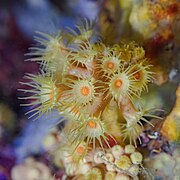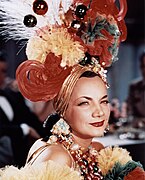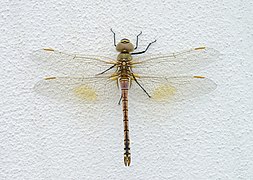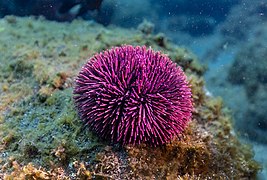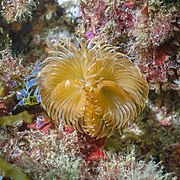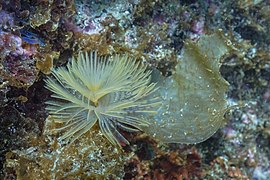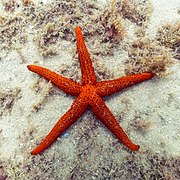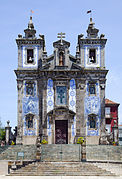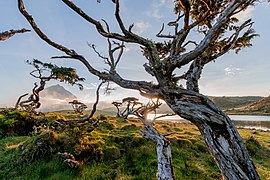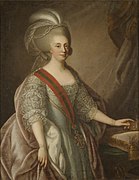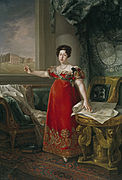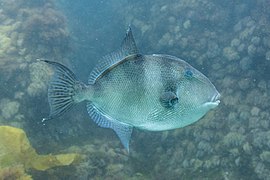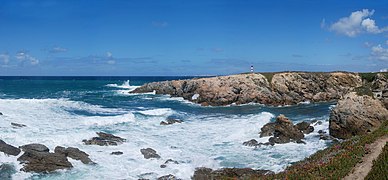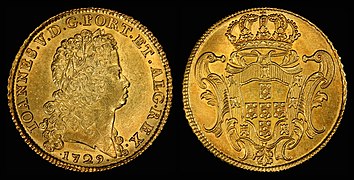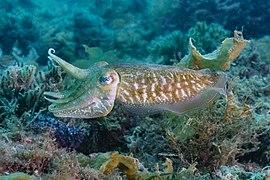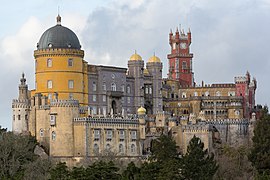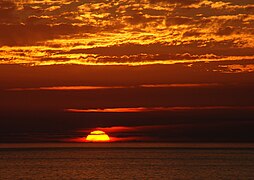Welcome to the Portugal portal
Lisbon , the capital of Portugal, overlooking the Tagus riverFlag of Portugal Location of Portugal in Europe Portugal Portuguese Republic , is a country located on the Iberian Peninsula , in Southwestern Europe , and whose territory also includes the Macaronesian archipelagos of the Azores and Madeira . It features the westernmost point in continental Europe , its mainland west and south border with the North Atlantic Ocean and in the north and east, the Portugal-Spain border constitutes the longest uninterrupted border-line in the European Union . Its archipelagos form two autonomous regions with their own regional governments . On the mainland, Alentejo region occupies the biggest area but is one of the least densely populated regions of Europe. Lisbon is the capital and largest city by population , being also the main spot for tourists alongside Porto and Algarve .
One of the oldest countries in Europe, its territory has been continuously settled and fought over since prehistoric times . The territory was inhabited by the Celtic and Iberian peoples, such as the Lusitanians , the Gallaecians , the Celtici , Turduli , and the Conii . These peoples had some commercial and cultural contact with Phoenicians , ancient Greeks and Carthaginians . It was later ruled by the Romans , followed by the invasions of Germanic peoples together with the Alans , and later the Moors , who were eventually expelled during the Reconquista . First founded as a county within the Kingdom of León in 868, Portugal formally became an independent kingdom with the Treaty of Zamora in 1143.
During the 15th and 16th centuries Portugal led the Age of Discovery and established one of the longest-lived maritime and commercial empires , becoming one of the main economic and political powers of the time. By the early 19th century, events such as the 1755 Lisbon earthquake , the country's occupation during the Napoleonic Wars , and the resulting independence of Brazil in 1822 led to a marked decay of Portugal's prior opulence . This was followed by the civil war between liberal constitutionalists and conservative absolutists over royal succession from 1828 to 1834. The 1910 revolution deposed Portugal's monarchy, and established the democratic but unstable Portuguese First Republic , later superseded by the authoritarian regimes of Ditadura Nacional Estado Novo Democracy was restored after the Carnation Revolution (1974), ending the Portuguese Colonial War and eventually losing its remaining colonial possessions. (Full article...
A model of Estádio da Luz
Estádio da Luz Portuguese pronunciation: [ɨˈʃtaðiu ðɐ ˈluʃ] Estádio do Sport Lisboa e Benfica , was a multi-purpose stadium located in Lisbon , Portugal.
It was used mostly for
football matches and hosted the home matches of
S.L. Benfica and the
Portugal national team . The stadium was opened on 1 December 1954 and it was able to hold an official maximum of 120,000 people, making it the
largest stadium in Europe and the
third largest in the world in terms of capacity. Some of the biggest attendances include a game against
FC Porto with an estimated attendance between 135,000 and 140,000 people, the
1989–90 European Cup semi-final against
Olympique de Marseille and the
1991 FIFA World Youth Championship final between
Portugal and
Brazil with 127,000 people in each game. It also hosted the
1992 European Cup Winners' Cup Final , the second leg of the
1983 UEFA Cup Final , and the
1962 Intercontinental Cup . (
Full article... )
List of selected articles
This is a Featured article , which represents some of the best content on English Wikipedia. Porto lifted the European Champion Clubs' Cup (pictured) in 1987 and 2004.
Futebol Clube do Porto , an association football team based in Porto , is the most decorated Portuguese team in international club competitions. They have won two UEFA Champions League titles (in 1987 , as the European Cup, and 2004 ), two UEFA Europa League titles (in 2003 , as the UEFA Cup, and 2011 ), one UEFA Super Cup (in 1987 ), and two Intercontinental Cups (in 1987 and 2004 ), for a total of seven international trophies. In addition, they were Cup Winners' Cup runners-up in 1984 – their first European final – and lost three other UEFA Super Cup matches, in 2003 , 2004 , and 2011 .
Porto first participated in international competitions in 1956, when they qualified for the
second season of the European Cup as the domestic league winners. They lost their first two European matches against
Athletic Bilbao and were eliminated from the competition. Porto then debuted in the
Inter-Cities Fairs Cup (not organised by
UEFA ) in
1962–63 , in the Cup Winners' Cup in
1964–65 , and in the inaugural editions of the UEFA Cup (Fairs Cup successor) and UEFA Champions League (European Cup successor) in
1971–72 and
1992–93 , respectively. The club has qualified for UEFA competitions every season since 1974–75, and shares the second place in UEFA Champions League group stage appearances with
Bayern Munich (24), one less than
Barcelona and
Real Madrid . (
Full article... )
List of Featured articles
The following are images from various Portugal-related articles on Wikipedia.
Image 1 Monarchist counter-revolutionary soldiers holding the
flag of the monarchy after the capture of
Porto in 1919. (from
History of Portugal )
Image 2 Carnival parade in
Loulé ,
Algarve region. (from
Culture of Portugal )
Image 3 Monument of Pelagius at Covadonga where he won the
Battle of Covadonga and initiated the Christian
Reconquista of
Iberia from the Islamic
Moors . (from
History of Portugal )
Image 4 This 1755 copper engraving shows the ruins of
Lisbon in flames and a
tsunami overwhelming the ships in the harbor. (from
History of Portugal )
Image 5 Caliphate disintegrated into small
Taifas kingdoms in 1031. (from
History of Portugal )
Image 7 A bride and her groom in the carnival of Lazarim, Portugal (from
Culture of Portugal )
Image 9 Map of Spain and Portugal showing the conquest of Hispania from 220 B.C. to 19 B.C. and provincial borders. It is based on other maps; the territorial advances and provincial borders are illustrative. (from
History of Portugal )
Image 10 Natural cork bags. (from
Culture of Portugal )
Image 11 The arrival of the Portuguese in Japan, the first Europeans to reach it, initiating the
Nanban ("southern barbarian") period of active commercial and cultural exchange between Japan and the West. (from
History of Portugal )
Image 12 Mértola 's
former mosque was transformed into a church in 1238. (from
History of Portugal )
Image 15 "
Festa da Coca " during the
Corpus Christi celebration, in
Monção , Portugal (from
Culture of Portugal )
Image 16 Areas of the Roman province of Hispania occupied by the barbarian people c. 409-429 (from
History of Portugal )
Image 18 Map of Brazil issued by
Portuguese explorers in 1519 (from
History of Portugal )
Image 19 Visigothic kingdom in Iberia from 625 to 711 (from
History of Portugal )
Image 21 The neighborhood of
Parque das Nações , in Lisbon, where was held the
1998 World Exposition , is a symbol of the economic modernization and development of Portugal in the late 20th century. (from
History of Portugal )
Image 22 Megalithic spirals,
cromlech near
Évora (from
History of Portugal )
Image 23 Iberian Peninsula
c. 560.
Suebi territory with its capital in
Braga (blue);
Visigothic territory with its capital in
Toledo (green) (from
History of Portugal )
Image 25 Maios celebration in Madeira island
[1] (from
Culture of Portugal )
Image 27 Most of Portugal and Spain as
Caliphate of Córdoba circa 929 to 1031. (from
History of Portugal )
Image 28 Gomes da Costa and his troops march victorious into Lisbon on 6 June 1926. (from
History of Portugal )
Image 29 Example of Castræ round houses,
Citânia de Briteiros (from
History of Portugal )
Image 31 Portuguese rejoice during the 1975 Carnation Revolution. (from
History of Portugal )
Image 32 "Levantamento do mastro" in Fonte Arcada, Portugal (from
Culture of Portugal )
Image 33 Vasco da Gama landing in
Kerala, India (from
History of Portugal )
Image 34 John IV of Portugal (from
History of Portugal )
Image 35 Portuguese discoveries and explorations: first arrival places and dates; main Portuguese
spice trade routes in the
Indian Ocean (blue); territories of the
Portuguese Empire under
King John III rule (1521–1557) (green). The
disputed discovery of Australia is not shown. (from
History of Portugal )
Image 36 The frontispiece of the 1826 Portuguese Constitution featuring King-Emperor
Pedro IV and his daughter Queen
Maria II (from
History of Portugal )
Image 37 The Roman Provinces
Lusitania and
Gallaecia , after the reorganization of
Diocletian AD 298 (from
History of Portugal )
Image 38 Dolmen of Cerqueira,
Sever do Vouga (from
History of Portugal )
Image 39 Typical Portuguese filigree heart shaped pendant, an iconic item in Portuguese fashion and design. (from
Culture of Portugal )
Image 40 The main language areas in Iberia, circa 300 BC. (from
History of Portugal )
Image 41 Aroeira 3 skull of 400,000 year old
Homo heidelbergensis .
The oldest trace of human history in Portugal. (from
History of Portugal )
Image 42 Caretos in the carnival of Podence, Portugal (from
Culture of Portugal )
Image 44 Gil Vicente , 16th-century Portuguese
playwright (from
Culture of Portugal )
Image 45 Portuguese colonies in Africa by the time of the Colonial War. (from
History of Portugal )
Image 46 Flute player of Podence (from
Culture of Portugal )
Image 48 Rooster of Barcelos , the iconic Portuguese souvenir (from
Culture of Portugal )
"
Lies have short legs "
A mentira tem perna curta
This is a Good article , an article that meets a core set of high editorial standards. Ruins of St. John the Baptist Church in Andheri , built by the Portuguese Jesuits in 1579. Bombay, also called Bom Bahia or Bom Baim Indo-Portuguese creole , Mumbai in the local language; is the financial and commercial capital of India and one of the most populous cities in the world . It's also the cosmopolitan city centre of the Greater Bombay Metropolitan Area , and the cultural base of the Bollywood film industry. At the time of arrival of the Portuguese Armadas , Bombay was an archipelago of seven islands . Between the third century BCE and 1348, the islands came under the control of successive Hindu dynasties. The Delhi Sultanate had been ruling the area along with Chaul , New Bombay (Thana ) & Damaon , with the administrative centre in Bassein (Vasai) since the raids of Malik Kafur in the Konkan region and across the Indian subcontinent. This territory in North Konkan along with the Bombay islands were later taken over by the Sultan of Guzerat from 1391 to 1534, when he had declared the end of the suzerainty to Delhi, after the Timurid invasion of it. Growing apprehensive of the power of the Moghal emperor Humayun , Sultan Bahadur Shah of Gujarat was obliged to sign the Treaty of Bassein on 23 December 1534; according to which, the seven islands of Bombay, Fort San Sebastian of Bassein in strategic town of Bassein (Vasai), and its dependencies were offered to the Portuguese East Indies . The places were only later officially surrendered on 25 October 1535, by the Sultan of Guzerat.
The
Portuguese in Goa-Anjediva and Bombay-Bassein were actively involved in the foundation and growth of their
Latin Christian religion in Bombay and the neighbour area. They called the island by various names, which finally took the written form
Bom Baim , when the islands were leased to several Portuguese officers during their regime. Portuguese
Franciscans and
Jesuits built several churches in the city, prominent ones are the
St Michael's Church at
Mahim ,
St John the Baptist Church at
Andheri ,
St Andrew's Church and the
Basilica of Mount Bandra (Bombay) at
Bandra , and
Gloria Church at
Byculla ,
Holy Spirit Church Nandakhal at
Virar . The Portuguese also built several fortifications around the city like the
Bombay Castle ,
Castella de Aguada (Castelo da Aguada or Bandra Fort), and
Madh Fort . (
Full article... )
Biology
Culture
Economy
Education
Geography
People
Politics
Religion
Category puzzle Select [►] to view subcategories
This is a list of recognized content, updated weekly by JL-Bot (talk · contribs ) (typically on Saturdays). There is no need to edit the list yourself. If an article is missing from the list, make sure it is tagged (e.g. {{ WikiProject Portugal }} ) or categorized correctly and wait for the next update. See WP:RECOG for configuration options.
Featured articles Former featured articles Featured lists Former featured lists Good articles Former good articles Did you know? articlesFeatured pictures
Alcobaça October 2021-1
Anémona de mar común (Anemonia viridis), Parque natural de la Arrábida, Portugal, 2020-07-21, DD 07
Anémona incrustante amarilla (Parazoanthus axinellae), Parque natural de la Arrábida, Portugal, 2022-07-20, DD 49
Argiope July 2012-3
Azulejos Parque Eduardo VII-2
Batalha September 2021-2
Campilhas March 2015-1a
Carmen Miranda in That Night in Rio (1941)
CastleSaintGeorge
Dragonfly Porto Covo August 2021-4
Erizo de mar violáceo (Sphaerechinus granularis), Madeira, Portugal, 2019-05-31, DD 40
Espirógrafo (Bispira volutacornis), Parque natural de la Arrábida, Portugal, 2020-07-23, DD 43
Espirógrafo (Sabella spallanzanii), Parque natural de la Arrábida, Portugal, 2020-07-23, DD 70
Estrella roja del Mediterráneo (Echinaster sepositus), Parque natural de la Arrábida, Portugal, 2020-07-31, DD 79
Gusano de fuego (Hermodice carunculata), Madeira, Portugal, 2019-05-31, DD 45
Iberian Peninsula antique map
Iglesia de San Ildefonso, Oporto, Portugal, 2012-05-09, DD 01
Lagoa do Capitão com montanha do pico
Lang's short tail blue (Leptotes pirithous) male underside
LuzLissabon
Maria I, Queen of Portugal - Giuseppe Troni, atribuído (Turim, 1739-Lisboa, 1810) - Google Cultural Institute
Maria Isabel of Portugal in front of the Prado in 1829 by Bernardo López y piquer
POR-4-Imperial Treasury-2400 Reis (1798-99)
Pez ballesta (Balistes capriscus), Parque natural de la Arrábida, Portugal, 2020-07-23, DD 24
Porto Covo pano April 2009-4
Porto3flat-cc-contr-oliv1002 edit2
Portugal 1729 8 Escudos
Puente Don Luis I, Oporto, Portugal, 2012-05-09, DD 13
Salmonete de fango (Mullus barbatus), Parque natural de la Arrábida, Portugal, 2020-07-21, DD 59
Sepia común (Sepia officinalis), Parque natural de la Arrábida, Portugal, 2020-07-21, DD 62
Sintra Portugal Palácio da Pena-01
Sunset 2007-1
Torre Belém April 2009-4a
Former featured portals In the News articles Main page featured articles Picture of the day pictures
Alcobaça October 2021-1
Anémona de mar común (Anemonia viridis), Parque natural de la Arrábida, Portugal, 2020-07-21, DD 07
Argiope July 2012-3
Azulejos Parque Eduardo VII-2
Campilhas March 2015-1a
CastleSaintGeorge
Dragonfly Porto Covo August 2021-4
Erizo de mar violáceo (Sphaerechinus granularis), Madeira, Portugal, 2019-05-31, DD 40
Estrella roja del Mediterráneo (Echinaster sepositus), Parque natural de la Arrábida, Portugal, 2020-07-31, DD 79
Gusano de fuego (Hermodice carunculata), Madeira, Portugal, 2019-05-31, DD 45
Iberian Peninsula antique map
Iglesia de San Ildefonso, Oporto, Portugal, 2012-05-09, DD 01
Lagoa do Capitão com montanha do pico
Lang's short tail blue (Leptotes pirithous) male underside
LuzLissabon
Maria I, Queen of Portugal - Giuseppe Troni, atribuído (Turim, 1739-Lisboa, 1810) - Google Cultural Institute
Maria Isabel of Portugal in front of the Prado in 1829 by Bernardo López y piquer
POR-4-Imperial Treasury-2400 Reis (1798-99)
Pez ballesta (Balistes capriscus), Parque natural de la Arrábida, Portugal, 2020-07-23, DD 24
Porto Covo pano April 2009-4
Porto3flat-cc-contr-oliv1002 edit2
Portugal 1729 8 Escudos
Puente Don Luis I, Oporto, Portugal, 2012-05-09, DD 13
Salmonete de fango (Mullus barbatus), Parque natural de la Arrábida, Portugal, 2020-07-21, DD 59
Sepia común (Sepia officinalis), Parque natural de la Arrábida, Portugal, 2020-07-21, DD 62
Sintra Portugal Palácio da Pena-01
Sunset 2007-1
Torre Belém April 2009-4a
Featured topics
Here are some tasks awaiting attention:
Purge server cache













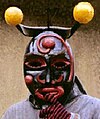




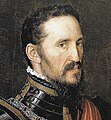





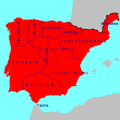





![Image 25Maios celebration in Madeira island [1] (from Culture of Portugal)](http://upload.wikimedia.org/wikipedia/commons/thumb/e/e1/2011-03-05_03-13_Madeira_045_Santana_%285543431418%29.jpg/120px-2011-03-05_03-13_Madeira_045_Santana_%285543431418%29.jpg)

